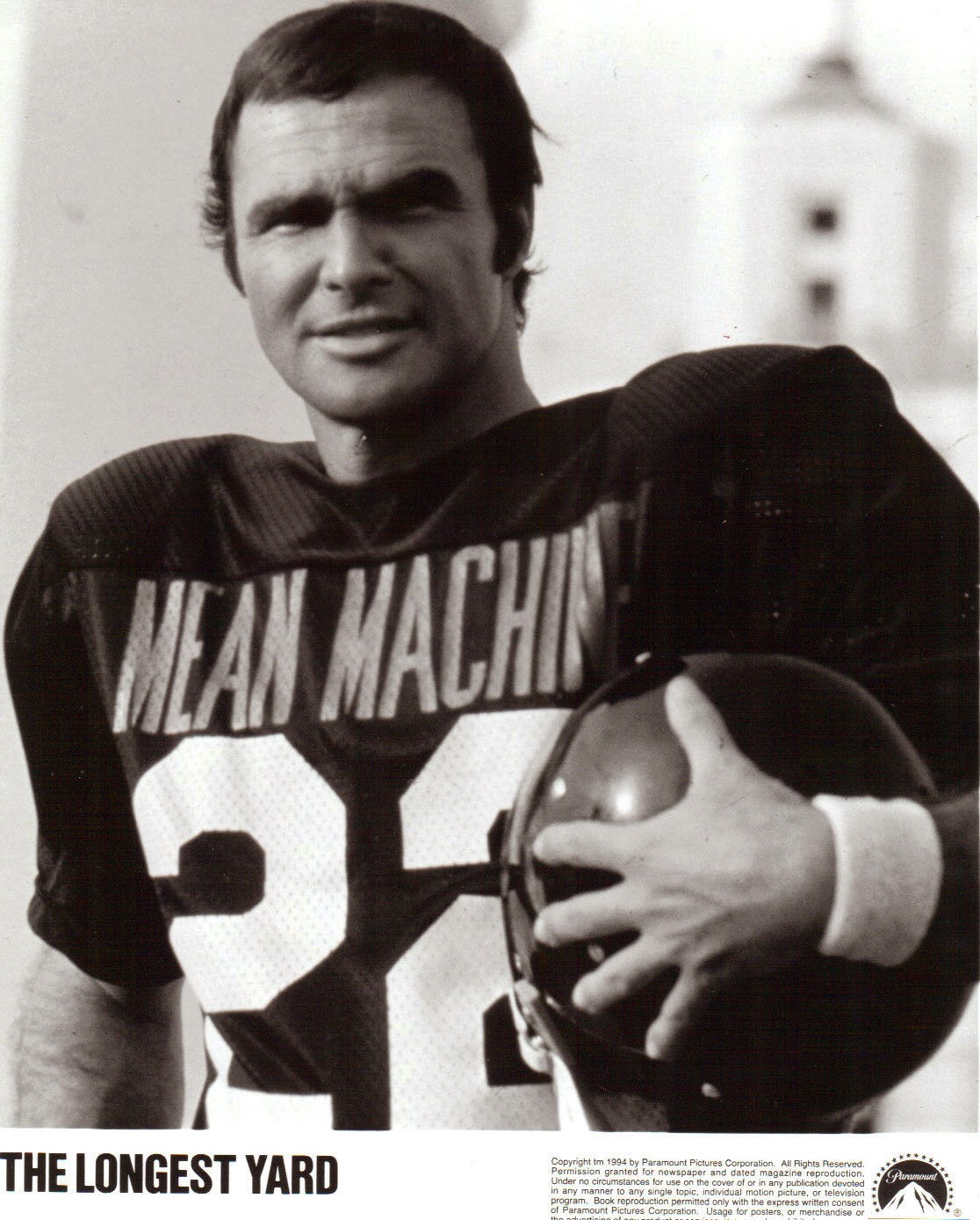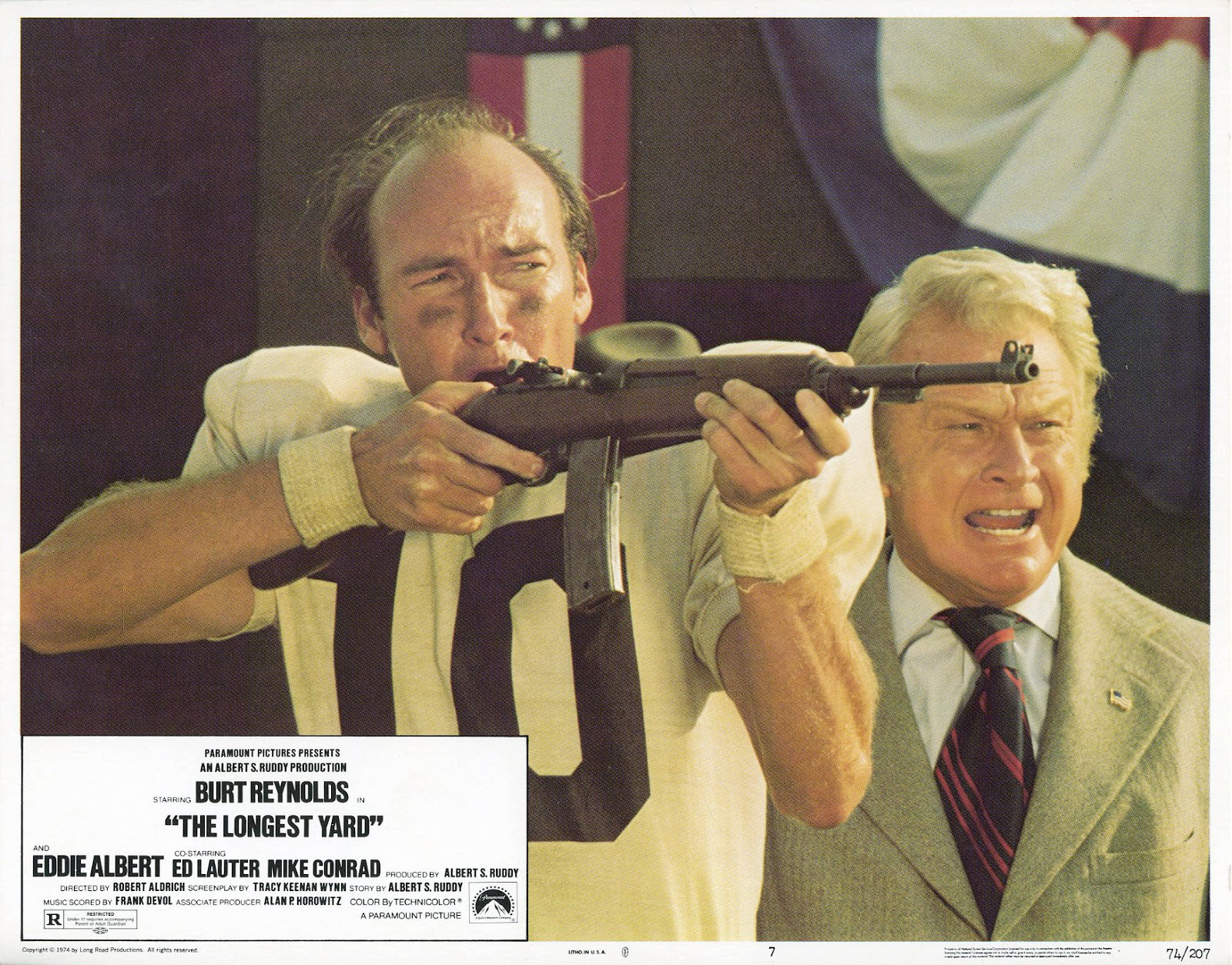Today’s box office birthday is one of our favorites here at Video Junkie as THE LONGEST YARD (1974) starring Burt Reynolds came out forty years ago on August 21, 1974. As a kid this was one of the first Burt flicks I saw and it proved to be the perfect thing to convert me into a lifelong (abusive) relationship as a Burt fan. The film literally had it all as it delivers a perfect mix of action, comedy, drama, and football!
Opening with the downward spiral of former football quarterback Paul “Wrecking” Crewe (Reynolds), the film tells the story of how Crewe is sent up the river to do some hard time and earns the ire of the prison warden (Eddie Albert) when the former standout refuses to play on the football team filled with guards. Crewe eventually gets the bright idea to put together a ragtag team of inmates in order to face the guards in a practice game and then gets an even brighter idea of deciding they are going to beat the sadistic guards at their own game.
Producer Albert S. Ruddy initially announced the idea for THE LONGEST YARD in March 1972. Two months later, Ruddy stated in Variety that they were offering the lead role of Paul Crewe to two actors: Clint Eastwood and Burt Reynolds. Eastwood seems a logical pick since he was just coming off the biggest hit of his career in DIRTY HARRY (1971). The choice of Reynolds was a bit more outside-of-the-box as he wasn’t as established at the box office (although he had had some success on TV for over a decade, including a stint on GUNSMOKE and, more recently, the detective series DAN AUGUST). All that would change in July 1972 when DELIVERANCE (1972) became a big hit for Warner Bros., ending up the fifth highest grossing film of the year. It also didn’t hurt that Burt had ladies’ tongues collectively wagging nationwide as he also did his legendary nude centerfold for Cosmopolitan that year. Reynolds committed to starring in THE LONGEST YARD in March 1973; his big screen presence was further solidified that year with the release of SHAMUS in January and WHITE LIGHTNING in August, just a few weeks before he began filming YARD in Georgia.
Looking back on it now, Reynolds is seemingly the only actor who could have played this lead role. Having played football in high school and at Florida State University in the 1950s, Reynolds had dreams of a professional career, but they were cut short due to a car accident. The filmmakers wisely surrounded Reynolds with great character actors and pro-football players (Ruddy mentioned possibly casting Joe Namath in a supporting role in 1972). The end result is not only entertaining teams of both oddball heroes and downright scary villains, but a formula that proved to be a success with audiences when the film was released. According to Variety, the film began its theatrical engagement with a world premiere at the Loew’s State I in New York City on August 21, 1974. It was an immediate success at the box office as the film unseated DEATH WISH (1974) in the number one spot and stayed there for two weeks before being bumped by CHINATOWN (1974). Jesus, ‘twas a good time to be a movie fan. THE LONGEST YARD stuck around well into 1975, eventually earning just over $43 million domestically. It was the ninth highest grossing film at the box office. The film even got four Golden Globe nominations (Best Film – Comedy/Musical, Best Actor [Reynolds], Best Supporting Actor [Albert], Best Newcomer [James Hampton]) and it won the Best Film award. Over time the film became celebrated as both a football and prison classic, so much so that we eventually got not one but two remakes in the new century. The less said about those, the better but Reynolds did return for the Adam Sandler remake (my fingers burn just typing that) released in 2005.
In what would be a pattern through his career, Reynolds followed this newfound silver screen success with a series of moderate successes (W.W. AND THE DIXIE DANCE KINGS [1975], HUSTLE [1975], GATOR [1976]) before reentering the box office top ten mantle with SMOKEY AND THE BANDIT (1977), the second biggest hit of its release year behind some film called STAR WARS.














Somehow fitting that Robert Aldrich doesn't get a mention above, since he's one of those directors with a surprising number of certifiable classics to his name (Whatever Happened to Baby Jane, Hush Hush Sweet Charlotte, Kiss Me Deadly, Flight of the Phoenix, The Dirty Dozen, All the Marbles!) who never seems to get the credit he deserves.
ReplyDelete